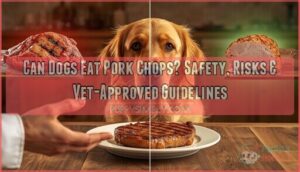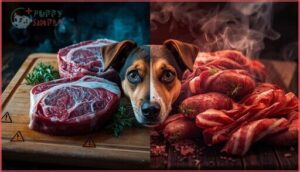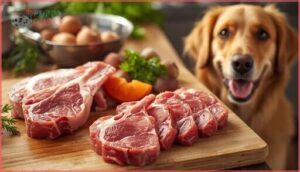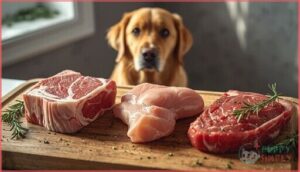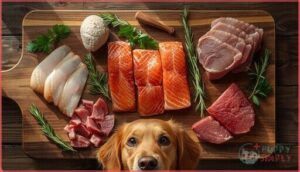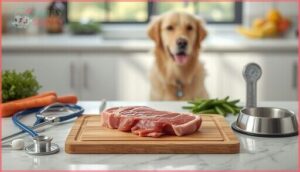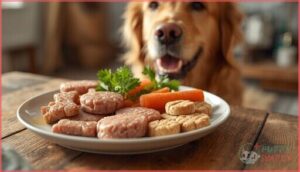This site is supported by our readers. We may earn a commission, at no cost to you, if you purchase through links.
Your dog’s pleading eyes at dinner can make it tempting to share that juicy pork chop on your plate, but is it actually safe? The answer isn’t as straightforward as you might expect.
While pork chops can offer valuable protein and essential nutrients for your dog, they come with specific preparation requirements and potential risks that every pet owner needs to understand. Raw pork poses serious health threats, and even cooked chops can cause problems if they’re seasoned, fatty, or contain bones.
Before you toss your pup a piece, you’ll need to know exactly how to prepare pork safely, which cuts to choose, and when it’s better to skip it altogether.
Table Of Contents
- Key Takeaways
- Can Dogs Eat Pork Chops Safely
- Risks of Feeding Raw or Processed Pork
- Choosing The Right Pork for Your Dog
- Pork Chops Vs Other Protein Sources
- Safety Guidelines for Feeding Pork Chops
- Healthy Pork Treats for Your Dog
- Frequently Asked Questions (FAQs)
- Can dogs eat cooked pork chops?
- What meat should dogs not eat?
- How much pork is too much for a dog?
- What dogs Cannot eat pork?
- How much pork can dogs eat weekly?
- Are pork chops suitable for puppies?
- Can organic pork be better for dogs?
- Do pork additives affect dog health?
- How to store leftover pork for dogs?
- Can dogs have pork chops with vegetables?
- Conclusion
Key Takeaways
- Dogs can safely eat pork chops only when they’re thoroughly cooked to 145°F, completely boneless, trimmed of all visible fat, and served plain without any seasonings, marinades, or additives that could trigger pancreatitis or toxicity.
- Raw pork poses serious parasitic risks from Trichinella spiralis, while processed pork products like bacon and ham contain dangerously high sodium levels (300-500 mg per serving) and preservatives that can cause digestive upset and long-term health problems.
- Lean cuts like pork loin and tenderloin (3-4% fat) provide complete protein with essential amino acids and B vitamins, but should make up less than 10% of your dog’s daily calories to maintain nutritional balance and prevent obesity-related complications.
- Puppies, senior dogs, and pets with pre-existing conditions like pancreatitis or pork allergies require extra caution—always introduce pork gradually with thumbnail-sized portions, monitor for symptoms like vomiting or diarrhea for 72 hours, and consult your vet before making dietary changes.
Can Dogs Eat Pork Chops Safely
Yes, dogs can eat pork chops safely when you prepare them the right way. The key is cooking them thoroughly, removing all bones, and skipping any seasonings or marinades that could harm your dog.
Let’s walk through what makes pork chops a safe protein choice and how to serve them without putting your dog at risk.
Benefits of Pork Chops for Dogs
Pork chops can actually support your dog’s health when you prepare them correctly. Raw pork contains 70-80% moisture and delivers complete protein with all the essential amino acids your pup needs for muscle growth and repair. You’ll also find B-complex vitamins—especially B1, B3, and B6—that fuel energy metabolism and keep the nervous system humming. Zinc and selenium boost immune function while supporting thyroid health.
When fully cooked and served plain, pork offers a palatable protein source that adds variety to your dog’s diet without compromising canine nutrition or pet wellness. Understanding the importance of a systematic review process is essential for evaluating the nutritional benefits of pork chops for dogs.
Nutritional Value of Pork Chops for Dogs
A single 100-gram serving delivers roughly 24 grams of complete protein packed with essential amino acids—leucine, lysine, and methionine—that build and repair your dog’s muscles. The mineral profile includes zinc, phosphorus, and potassium, supporting immune function and bone health. Zero dietary fiber keeps the nutrient balance protein-focused, ideal for canine nutrition. This balance is supported by the amino acid content that promotes overall health.
You’ll also get thiamine at 41% of daily value, niacin at 50%, and vitamin B12 for energy metabolism.
How to Cook Pork Chops for Dogs
When you’re preparing cooked pork chops for your pup, heat them to at least 145°F and let them rest three minutes—that’s your baseline for safe handling practices. Trim every bit of visible fat to under 10% and ditch the bones entirely; they splinter.
Skip garlic, onion, salt, and marinades. Plain wins every time. Cut portions to match your dog’s size, cool completely, and you’ve nailed pork safety for dogs.
Precautions for Feeding Pork Chops to Dogs
Even lean, properly cooked pork can backfire if you’re not careful. Your dog’s tolerance varies wildly—overweight pups face 2–2.5x higher risk of digestive upset from fat. Watch for these red flags:
- Temperature matters: Cook to 160°F minimum to eliminate harmful bacteria and prevent gastroenteritis
- Monitor portion size: Match serving to your dog’s weight to avoid pancreatitis
- Watch for symptoms: Vomiting or diarrhea signals pork allergy or intolerance—stop immediately
Pork safety for dogs isn’t negotiable.
Risks of Feeding Raw or Processed Pork
Raw and processed pork present serious health threats that cooked, plain pork doesn’t. The risks range from parasitic infections to toxic additives hidden in everyday meat products.
Here’s what you need to watch out for regarding unsafe pork.
Dangers of Trichinosis in Raw Pork
Raw pork carries Trichinella spiralis larvae, the culprit behind trichinosis—a parasitic infection you don’t want your dog facing. While infection rates have dropped thanks to modern meat inspection, undercooked pork chops still pose real risks.
Your dog might experience vomiting and diarrhea within 24–72 hours of eating contaminated meat, potentially progressing to severe muscle pain.
The good news? Cooking pork to an internal temperature of 160°F eliminates these parasites completely, making proper food safety your best defense against this preventable illness.
Health Risks of Processed Pork for Dogs
Processed pork poses distinct canine health risks that go beyond simple nutrition concerns. Products like bacon and ham contain 300-500 mg of sodium per serving, potentially triggering hypertension and gastrointestinal issues in your dog.
The high fat content greatly increases pancreatitis risk—especially dangerous for overweight pets. Preservatives like nitrates can upset your dog’s digestive system, while excess calories contribute to obesity factors that compound existing health problems over time.
How to Avoid Processed Pork Risks
When shopping for your dog, scan food labels for sodium levels above 300 mg per serving—a red flag for processed meat dangers. Skip bacon, ham, and seasoned products entirely.
Instead, choose plain cooked pork chops or lean cuts you prepare at home, giving you complete control over pork safety tips.
Your vet can recommend healthy pork alternatives and safe feeding practices customized to your dog’s needs.
Choosing The Right Pork for Your Dog
Not all pork is created equal regarding your dog’s health. The cut you choose, how it’s prepared, and the quality of the meat all play a role in whether it’s a safe addition to their bowl.
Let’s break down what you should look for to keep your pup both happy and healthy.
What to Look for in Cooked Pork
When feeding dogs pork, you need to verify the internal temperature reaches 145°F to eliminate bacterial risks. Cooked pork chops should be boneless, lean cuts with visible fat trimmed away—excess fat content can trigger pancreatitis. Avoid any seasoning; plain is best.
Store portions properly in the refrigerator within two hours of cooking methods used, or freeze at 0°F for safe storage that maintains pork nutrition for dogs.
- Check that cooked pork shows no pink interior before serving
- Remove all bone fragments to prevent choking hazards
- Skip garlic, onions, and salt when preparing pork chops
How to Select Lean and Healthy Pork
The leanest pork chops—loin and tenderloin cuts—contain just 3–4% fat by weight, making them ideal choices for your dog’s balanced diets. When shopping, look for fresh, firm pork meat with a pale pink color and no strong odor. Trim all visible fat before cooking to support fat reduction and minimize pancreatitis risk.
| Cut Type | Fat Content | Best For |
|---|---|---|
| Pork Loin | 3–4% | Daily rotation |
| Tenderloin | 3–4% | Low-fat needs |
| Shoulder | 8–10% | Occasional only |
| Ribs | 15–20% | Avoid for dogs |
| Ham (processed) | Variable | Never feed |
Choose antibiotic-free, “fresh not cured” labels to secure peak pork nutrition for dogs while avoiding unnecessary sodium in cooked pork chops.
Tips for Introducing Pork to Your Dog’s Diet
Introducing pork to dogs requires a gradual approach to avoid digestive upset. Start with a thumbnail-sized piece of cooked, plain pork chops—about a quarter-ounce for small breeds—and wait three days before increasing. Monitor for dog allergies like itching or loose stools.
Follow feeding guidelines by keeping pork under 10% of daily calories, ensuring canine dietary needs stay balanced. Always seek veterinary advice before major meal planning changes.
Pork Chops Vs Other Protein Sources
Pork chops aren’t the only protein option for your dog, and understanding how they stack up against other choices helps you make informed decisions.
Each protein source brings its own nutritional profile, fat content, and digestibility factors to weigh.
Let’s look at how pork compares to common alternatives and how rotating proteins can benefit your dog’s overall health.
Comparison With Chicken and Beef
Protein sources in dog nutrition each bring distinct nutrient profiles to the table. When comparing meat options for canine dietary needs, pork chops deliver roughly 22–25% protein per 100g—matching skinless chicken breast. However, fat content is crucial: even trimmed pork often contains more fat than chicken, which impacts pet food safety and dietary balancing. Beef edges ahead with higher iron and zinc levels, supporting dog health through improved immune function. Always cook proteins thoroughly and rotate sources to meet your dog’s full nutritional needs.
| Protein Source | Key Nutritional Strengths | Fat Content Considerations |
|---|---|---|
| Pork Chops | High-quality protein (22–25%), thiamin, niacin, zinc, selenium | Higher fat than chicken; requires trimming for weight management |
| Chicken | Lean protein, low fat, widely digestible | Lower fat content aids weight control and reduces pancreatitis risk |
| Beef | Higher iron and zinc, ample B vitamins | Fat varies by cut; lean options needed for calorie control |
Alternative Protein Sources for Dogs
Beyond pork chops, your dog benefits from dog nutrition that emphasizes protein variety. Turkey, salmon, and duck bring unique nutrient balance profiles to support canine health. Lamb suits pets with food allergies, while white fish offers lean animal nutrition. Rotating protein sources every 4–6 weeks promotes pet wellness, reducing allergen exposure and supporting immune function.
Below, compare key alternatives to guide your choices:
| Protein Source | Nutritional Highlights | Best For |
|---|---|---|
| Turkey | High protein, low fat, rich in selenium | Weight management, sensitive stomachs |
| Salmon | Omega-3s, vitamin D, EPA/DHA | Skin health, joint support, anti-inflammatory needs |
| Lamb | Novel protein, zinc, B12 | Dogs with chicken or beef allergies |
| Duck | Iron, amino acids, moderate fat | Flavor variety, allergy rotation diets |
| Venison | Lean, hypoallergenic, high-quality protein | Dogs needing limited-ingredient options |
How to Rotate Protein Sources for Dogs
After exploring these alternatives, you’ll want a plan. Rotate protein sources every four to six weeks—switching from pork to chicken, then salmon or turkey—to support nutrient balance and reduce allergy risk. This dietary variety keeps meal planning simple while promoting canine health and nutrition. Track changes in stool consistency and energy during transitions, and always follow veterinary advice for dogs with special needs.
| Protein Source | Rotation Frequency | Key Benefits |
|---|---|---|
| Pork | Every 4–6 weeks | B vitamins, zinc, amino acids |
| Chicken | Every 4–6 weeks | Lean protein, affordability |
| Salmon | Every 4–6 weeks | Omega-3s, anti-inflammatory support |
| Turkey | Every 4–6 weeks | Low-fat, gentle on digestion |
| Beef | Every 4–6 weeks | Iron, complete amino acid profile |
Safety Guidelines for Feeding Pork Chops
Even though pork chops can be a safe protein option, certain dogs need extra care and there are a few practical risks you’ll want to sidestep. Puppies and senior dogs have different nutritional needs, pork bones can turn dangerous quickly, and improper storage opens the door to bacterial contamination.
Let’s walk through the key safety measures that’ll keep your dog healthy and happy.
Precautions for Puppies and Senior Dogs
Puppies and senior dogs need your extra attention regarding pork chops. Young pups face higher pancreatitis risk from fatty cuts—about 34% of vets recommend avoiding them altogether.
Senior health suffers when reduced digestive efficiency meets rich pork, spiking triglycerides by roughly 22%. Skip processed options like bacon; their high sodium raises hypertension risk by 15% in aging dogs.
Always prioritize lean, plain, cooked pork and consult your vet about dietary restrictions.
How to Avoid Choking Hazards With Pork Bones
When bones splinter, they become silent threats to your dog’s airway and digestive tract. Cooked pork chop bones increase splintering risk by 15–30%, creating sharp fragments that can lodge in your dog’s throat or perforate internal organs. Veterinary data shows bone fragments cause choking in roughly 10% of cases involving bone-feeding.
Splintered pork chop bones can silently choke or injure your dog, causing serious airway and digestive tract dangers
Follow these choking prevention strategies:
- Remove all bones before serving pork to eliminate fragmentation risks entirely
- Cut boneless pork into bite-sized pieces appropriate for your dog’s size
- Supervise every feeding session to catch early signs of distress
- Choose dental chews designed for canine airway safety instead of real bones
- Contact your vet immediately if gagging or difficulty breathing occurs
Tips for Storing and Handling Pork Safely
Proper pork storage and handling guidelines protect your dog from foodborne illness. Refrigerate fresh pork chops at 34–39°F and use within 3–5 days, or freeze for up to six months. Always thaw in the fridge—never on the counter—to prevent bacterial growth.
Use separate cutting boards for raw pork to avoid cross-contamination with other pet food. Cook to 145°F internal temperature to guarantee meat safety.
Healthy Pork Treats for Your Dog
If you’d rather skip the prep work and still give your dog a safe pork option, there are plenty of quality commercial treats on the market. These products take the guesswork out of portion sizes and cooking times while offering the protein your dog craves.
Here are three vet-approved pork treats that meet safety standards and deliver nutritional value.
Review of Stella & Chewy’s Meal Mixers Purely Pork
When you’re looking for a trustworthy meal mixer, Stella & Chewy’s Purely Pork stands out for its transparent label and pork-first ingredient list.
This freeze-dried option contains no artificial fillers—a win for pet food safety and canine digestion.
It’s a smart way to boost your dog’s regular dog food with quality pork nutrition without the hassle of cooking pork chops yourself.
Review of Premium Pork Chomps Roasted Pork Ribz
Premium Pork Chomps Roasted Pork Ribz offer a satisfying chew that most dogs eagerly accept, though pet food ratings highlight the importance of moderation in any canine diet plan.
These treats deliver pork nutrition facts your pup craves—protein-rich and flavorful—without artificial additives that compromise dog food safety.
From a veterinary advice standpoint, they’re a solid choice when you’re rotating pork chops alternatives into your pet nutrition routine, balancing canine health with enjoyment.
Review of Full Moon Sliced Pork Jerky Treats
Full Moon Sliced Pork Jerky Treats deliver straightforward pork nutrition without artificial fillers—something your dog’s digestive system will appreciate. When evaluating treat ingredients, you’ll notice these jerky strips contain minimal processing, which aids dog health and nutrition goals better than heavily preserved alternatives.
From a pet food review standpoint, they’re easier to portion than bulky pork chops, making them practical for training or occasional rewards. Monitor your dog’s reaction during the first few servings, as pork jerky safety depends on individual tolerance.
Remember, these treats complement balanced dog food rather than replacing core meals in your pet care and feeding routine.
Frequently Asked Questions (FAQs)
Can dogs eat cooked pork chops?
Picture your dog waiting eagerly by the kitchen, nose twitching. Feeding Dogs Cooked Pork Chops is safe if the meat is plain, boneless, and fully cooked—no seasonings.
This promotes dog health and nutrition while prioritizing Meat Safety.
What meat should dogs not eat?
You should avoid feeding dogs Toxic Meats like raw fish, wild game, and exotic meats, as well as processed foods such as salami, bacon, and undercooked pork chops.
These can trigger meat toxicity, food allergies, and serious health risks.
How much pork is too much for a dog?
Wondering where to draw the line with pork chops? For most dogs, Pork Intake Limits mean treats only—about 1–2 ounces, plain and cooked, per meal.
Always consider Dog Size Guidelines, Feeding Frequency, and watch for Pork Allergy Risks.
What dogs Cannot eat pork?
Dogs with pork allergies, chronic pancreatitis, or obesity shouldn’t eat pork due to digestive issues and parasite concerns like trichinosis.
Pre-existing nutrient deficiencies or food allergies also warrant caution, especially with fatty cuts or pork bones.
How much pork can dogs eat weekly?
For healthy adult dogs, limit pork to 1–2% of body weight daily—roughly 4–6 ounces for medium breeds.
Keep weekly pork intake under 10% of total calories to maintain protein balance and avoid fat-related risks.
Are pork chops suitable for puppies?
Picture a puppy gnawing a pork chop bone—like giving a toddler a chainsaw.
For Puppy Nutrition and Pork Safety, only offer small, boneless, lean, fully-cooked pieces.
Always consult your vet for tailored Dog Feeding guidance.
Can organic pork be better for dogs?
Organic pork benefits your dog by reducing exposure to pesticides and hormones, but it doesn’t eliminate pork allergy risks or the need for safe preparation.
For canine health, always cook thoroughly, trim fat, and consult your vet about canine diet planning.
Do pork additives affect dog health?
Pork preservatives and additives—like sodium, nitrites, or artificial flavors—can pose additive risks for dog health, especially in sensitive pets.
For pet food safety and canine wellness, always check labels and consult pet nutritionists before offering processed pork products.
How to store leftover pork for dogs?
For safe pork storage, cool leftovers within two hours, then refrigerate in airtight containers for up to three days.
For longer keeping, freeze portions at 0°F, ensuring they’re plain and bone-free to protect pet health and food safety.
Can dogs have pork chops with vegetables?
You can serve a Pork Vegetable Mix—think lean, cooked pork chops with plain carrots or green beans—to your dog.
For canine health, stick to Safe Feeding Tips and Balanced Diet Plans, especially if Dog Food Allergies exist.
Conclusion
Like choosing the right path at a fork in the road, knowing if your dog can eat pork chops comes down to preparation and awareness. Lean, plain, well-cooked pork can be a safe treat, but bones, fat, and seasonings can turn a simple meal into a hazard.
Trust your instincts, follow vet-approved guidelines, and remember: your dog’s health relies on the choices you make. When in doubt, err on the side of caution and keep mealtime safe.

